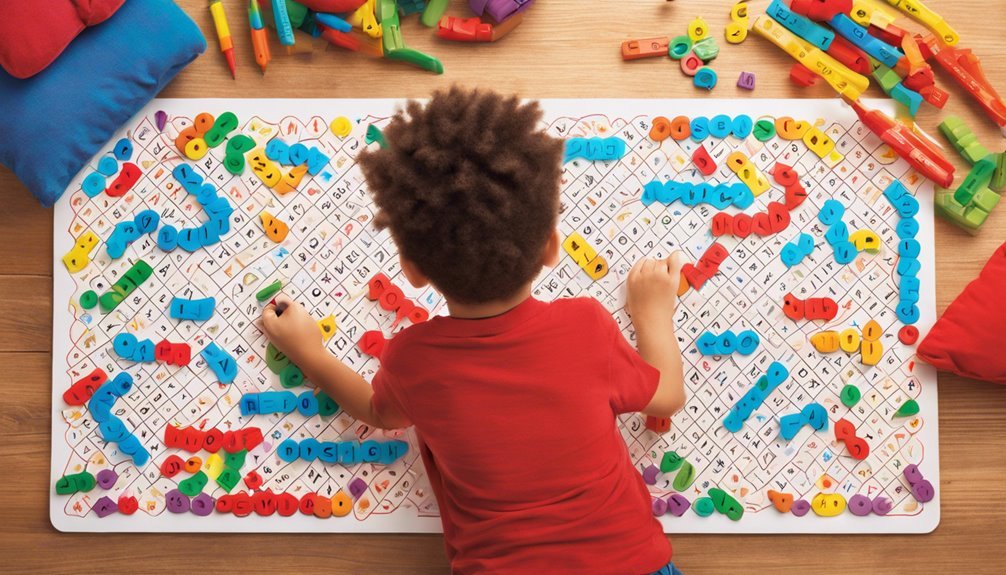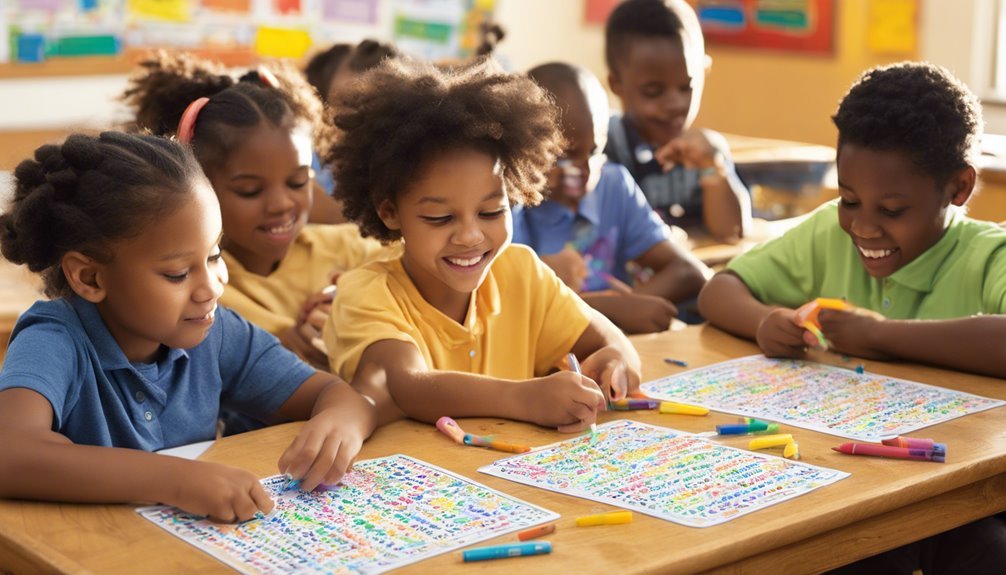"Cherishing Little Steps - A Haven for Baby and Family Journeys"
How Word Search Puzzles Teach Kids About Opposites
Did you know that incorporating word search puzzles into learning can significantly boost a child's understanding of opposites? These puzzles aren't just a fun pastime; they actively enhance vocabulary and critical thinking skills. As children search for antonyms like "big" and "small," they engage with language in a dynamic way. This interactive experience leads to not just recognition but a deeper grasp of contrasting concepts. So, how can you effectively use these tools to enrich your child's learning journey?
Key Takeaways
- Word search puzzles featuring opposite pairs, like "hot" and "cold," help children recognize and understand contrasting concepts effectively.
- Engaging with opposite words in puzzles promotes vocabulary expansion and enhances language comprehension among young learners.
- Visual representation of opposites within a grid format aids in grasping the concept of antonyms, reinforcing cognitive development.
- Solving word searches encourages critical thinking as children analyze and categorize words, deepening their understanding of language relationships.
- Incorporating playful learning through puzzles increases motivation, making the exploration of opposites both enjoyable and educational for kids.
The Importance of Learning Opposites
Understanding opposites is crucial for children's cognitive development and language skills. When kids grasp antonyms, they expand their vocabulary and deepen their comprehension of language.
This understanding lays the foundation for synonyms exploration, allowing them to recognize relationships between words. For instance, when they learn that "hot" can be contrasted with "cold," it reinforces their grasp of both terms, enhancing their overall communication abilities.
By engaging with opposites, children sharpen their critical thinking skills, as they analyze and categorize different concepts. Encouraging discussions about contrasting ideas not only enriches their linguistic repertoire but also fosters creativity and problem-solving.
How Word Search Puzzles Enhance Vocabulary
While exploring the world of word search puzzles, you'll find they offer much more than just entertainment; they're powerful tools for vocabulary enhancement. Engaging with these puzzles boosts your vocabulary development and hones your language skills in a fun way. As you search for words, you not only reinforce your understanding of existing vocabulary but also encounter new terms that broaden your linguistic horizons.
| Word Type | Example |
|---|---|
| Nouns | Adventure |
| Adjectives | Vibrant |
| Verbs | Explore |
These puzzles challenge you to think critically and connect words, improving retention and recall. So, dive into a puzzle, and watch your vocabulary flourish!
Engaging Critical Thinking Through Word Searches

Word searches are more than just a fun pastime; they engage your critical thinking skills in dynamic ways. As you search for words, you're not just scanning letters; you're actively enhancing your cognitive development.
This process sharpens your ability to analyze patterns, make connections, and solve problems.
- Boosts pattern recognition
- Encourages strategic thinking
- Enhances memory retention
- Develops problem-solving skills
Incorporating Opposites Into Word Search Design
Incorporating opposites into word search design not only makes the puzzles more engaging but also introduces kids to fundamental language concepts. By using opposite pairs like "hot" and "cold" or "happy" and "sad," you create a dynamic learning experience.
These pairs provide a visual representation of contrasting ideas, helping kids grasp the concept of opposites more effectively. Consider arranging the words in a way that highlights their relationships; for instance, group them in quadrants or create a themed grid.
This approach fosters comprehension as children search for words, reinforcing their understanding of language. Plus, it challenges them to think critically about how words relate to one another, enriching their vocabulary and cognitive skills.
Benefits of Playful Learning in Education

Engaging with playful learning methods opens doors to deeper understanding and retention of knowledge. By incorporating interactive learning experiences, you foster an environment where students thrive through playful exploration. This approach not only makes learning enjoyable but also enhances cognitive development.
- Encourages creativity and critical thinking
- Builds social skills through collaboration
- Promotes a love for learning that lasts a lifetime
- Increases motivation and engagement in the classroom
When students interact with educational content in a playful way, they're more likely to grasp complex concepts.
Tips for Parents and Educators Using Word Searches
How can you make word searches an effective tool in your child's learning? Start by integrating them into creative activities that spark interest.
Encourage your child to create their own word searches focused on opposites, reinforcing their understanding while honing critical thinking skills. Use word searches as part of broader learning strategies—discuss the words found and their meanings to deepen comprehension.
Set a timer for added excitement, turning it into a friendly challenge. Lastly, celebrate their successes, no matter how small, to build confidence.
Frequently Asked Questions
How Can I Create My Own Word Search Puzzles at Home?
Creating your own DIY word searches at home is easy and fun! Start by using customizable templates available online or draw your own grid on paper.
Choose a theme, then list words related to it. Fill in the grid with the words, placing them horizontally, vertically, or diagonally. Finally, add random letters to fill the empty spaces.
You can even challenge friends or family to find the words you've hidden. Enjoy the process!
Are There Specific Age Groups That Benefit More From Word Searches?
When it comes to word searches, younger kids might struggle while older children thrive, showcasing the contrast in cognitive development.
Generally, kids aged 6 to 12 benefit most, as they're honing reading and vocabulary skills through these educational games. As they search for words, they're not just having fun; they're also enhancing their problem-solving abilities.
What Resources Are Available for Printable Word Search Puzzles?
If you're looking for printable word search puzzles, plenty of resources are available online.
Educational websites like Education.com and Teachers Pay Teachers offer various themed puzzles, tailored to different age groups and skill levels.
You can easily download and print them for classroom use or at home.
These engaging activities not only entertain but also reinforce vocabulary and spelling skills.
Dive in, and you'll find a wealth of options to enhance learning!
How Can I Assess My Child's Understanding of Opposites?
When it comes to gauging your child's grasp of opposite pairs, think of it as a fun adventure in learning!
You can use vocabulary games that challenge them to match words like hot and cold or big and small.
Try asking them to explain what makes these words opposites, or encourage them to create their own sentences using these pairs.
This hands-on approach not only assesses their understanding but also reinforces their vocabulary skills.
Can Digital Word Search Puzzles Be as Effective as Paper Ones?
Digital word search puzzles can definitely be as effective as paper ones, depending on your child's preferences.
They often offer digital benefits like interactive features and instant feedback, which can boost engagement levels. Kids may find the colorful graphics and sounds in digital formats more stimulating, enhancing their learning experience.
Ultimately, it's about what keeps your child motivated and excited to learn, so consider both options to see what works best for them.
Conclusion
Incorporating word search puzzles into your child's learning routine is a smart strategy to sharpen their skills. By seeking out synonyms and antonyms, kids can grasp the great game of opposites while having heaps of fun. This playful practice not only boosts their vocabulary but also builds critical thinking. So, dive into delightful word searches together, and watch as your child flourishes in understanding and creativity. Learning opposites has never been so engaging!

